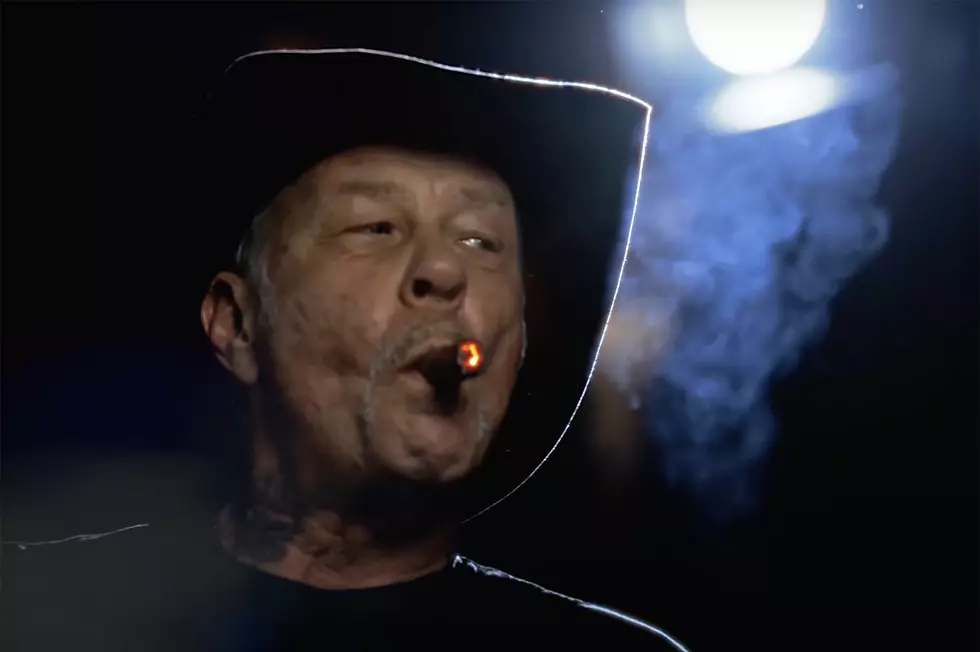
Metallica’s ‘Hardwired … to Self-Destruct’ Roundtable Review: Our Writers Answer Five Big Questions
Metallica's Hardwired ... to Self-Destruct arrives tomorrow with eight years of anticipation built in. How does it stack up against the band's best albums? Is it a step forward (or back) from their most recent project, 2008's Death Magnetic? Ultimate Classic Rock writers gathered to discuss favorite, and not-so favorite, moments from Metallica's upcoming 10th studio effort – then tried to put Hardwired in context with the year's best metal albums.
1) What are your first impressions of Hardwired ... to Self-Destruct?
Matthew Wilkening: We’re never going to get another classic, fat-free Metallica album, it seems. But this one starts off great, with four songs that are worthy of all-time Metallica playlist inclusion. The sound is looser and fuller than on Death Magnetic, and James Hetfield delivers his best batch of riffs in pretty much forever. But after that strong opening quartet, things devolve into an more than sporadically interesting, but still too-often shapeless mid-tempo slog, with the notable exception of the closing “Spit Out the Bone.” More thrash – or a much shorter running time – would help greatly.
Jed Gottlieb: I like that Metallica split this album into two discs. But they divided the songs up all wrong. The band made the first disc more energetic (almost poppy) and the second more brooding. It would have been better if they sequestered the awesome songs on one disc and the lousy on the other disc. Unlike maybe any Metallica release before, Hardwired … to Self-Destruct shows off everything great and awful about the band. For every throwback thrash symphony or punk metal onslaught, there’s a cliched riff or overtly commercial chorus – often the differences clash on the same cut: Compare the blitzing guitar solo on “Here Comes Revenge” to drippy ballad sections.
Nick DeRiso: There's something thrilling – at least, at first – in hearing this band attempt to balance their thrashy roots and a more commercial present, all while screaming about various unknowable grievances and the returning Cthulhu, a planet-destroying creature from HP Lovecraft lore. But the long absence seems to have convinced them that every song must be stretched out to the point of distraction. Perhaps departed producer Rick Rubin might have been a more judicious editor? Either way, I had to chuckle during "Dream No More" when Hetfield sings, "Make it go away / Please make it go away."
Eduardo Rivadavia: Hardwired ... to Self-Destruct kind of sounds like a Metallica album for all seasons. Good as it was, Death Magnetic was a capitulation to fan desires after the nightmare of St. Anger. Hardwired sounds a lot more natural and unforced, like a confident combination of Death Magnetic's thrashy bits and Reload ... with good songs. Emphasis on songs. There haven't been this many memorable tunes on a Metallica record since Load.
Michael Christopher: There’s some great, chunky riffs and deep grooving going on. In some ways, it’s like the album that should’ve come out between Reload and Death Magnetic, incorporating some of the feel of the former – the best parts, really – but also has that old school thrash-vibe all over the place. The main issue I have is how concise and brutal the “Hardwired” single was, and all the talk about how the band used Kill ‘Em All as a starting point, but then nine of the 12 tracks are six and a half minutes or longer. It tends to meander a bit.
2) What's the best song?
Wilkening: I want to say “Hardwired” because it would be great to hear them stay that focused more often. But “Atlas, Rise!” has my favorite riffs and is the one that demonstrates everything that’s right about the album as a whole. Also, “Now That We’re Dead” has a really nice groove to it. Somehow, it seems to fit the role “Sad but True” did on the Black Album, without being a clone.
Gottlieb: Opener “Hardwired” is a front-runner because, at three minutes, it’s too short for them to screw up. While there are plenty of other great moments on other tracks, it’s hard to find one that kicks ass from top to bottom. I might have to go with “Atlas, Rise!,” because of so much of it shamelessly rips off Iron Maiden.
DeRiso: "Moth Into Flame" (which works like a career overview, bringing in all of their strengths over the course of a single song) replaced "Hardwired" (one of the album's rare moments of sharp focus), which in turn had replaced "Spit Out the Bone" (because I'm not sure my home speakers were going to survive another brutalization at its hands).
Rivadavia: This will probably change with repeat listens, but my favorite out of the gate is the very last song, "Spit Out the Bone," which is just fierce! Neck and neck is "Moth Into Flame," which strikes a perfect balance between legit thrash staccato riffs, strong lyrics and chorus and a instantly catchy lead guitar melody from Kirk Hammett. And the surprising "Halo on Fire" may just win the marathon for best song in the long run.
Christopher: “Spit Out the Bone.” I have a feeling many people are going to agree. It’s brutal, fast and barely comes up for air. There are also hints of every part of their career on it.
3) What's the worst song?
Wilkening: Every song has good parts and is built on cool riffs, but somewhere in the middle of Disc 2, the tempos cumulatively become too plodding and nondescript. It really would have helped to have one more straight-up thrasher in there somewhere. I’ll choose “Am I Savage?” as the worst, but when I move this album to my iPod, at least half of those songs aren’t making the journey.
Gottlieb: I thought I wanted longer Metallica songs, thought that might be the way for them to get over the pop metal flirtations they have. But that last two minutes of “Halo on Fire” go nowhere (and I’m generally a guy that gets off on big guitar crescendos). That said, half of “Dream No More” is just plain boring.
DeRiso: "Murder One" is an admirable failure, this moment where you realize both the depth of their love for Motorhead – and what made the late Lemmy Kilmister's music such a wonder of self-contained coolness.
Rivadavia: It's a toss-up between "Dream No More" and "Am I Savage," both of them being the kind of plodding, doom-like Metallica songs that – unlike, say, "The Thing That Should Not Be," "Harvester of Sorrow" or "Sad but True" – never really go anywhere, or climaxes in a satisfying payoff. "ManUNkind" is another head-scratcher full of complicated time signatures that Lars Ulrich must have lost a lot of sleep over, and should be a real love/hate proposition for many folks.
Christopher: “Murder One.” It’s too easy, too cheesy. I get the intent and how influential Motorhead were to Metallica, but to take a bunch of Lemmy’s lyrics and song titles and building a song around them just didn’t work.
4) Is this album better than Death Magnetic?
Wilkening: Yes. Although it was a welcome near-return to glory at the time, Death Magnetic sounds uptight, more formulaic and sonically thin in comparison to Hardwired. They seem more confident and comfortable this time around.
Gottlieb: No. But it’s not worse, which is a passive-aggressive way of saying both needed more work but don’t outright disappoint. And live, a few of these could be redeemed.
DeRiso: This seems to be a project bent on finding a third way, something that both recalls the far past of their thrash days – and the nearer one, where Metallica went mainstream. Fair enough. By the time they packed in all of those ideas, however, Hardwired ... to Self-Destruct had become unwieldy, and then occasionally forced. The admittedly flawed Death Magnetic more often felt like a true moment of release to me, giving it a slight advantage.
Rivadavia: Based on these first few spins, I'd have to say yes. It's certainly more interesting. For longtime Metallica fans, the primary emotion related to Death Magnetic was relief – that the band had gotten their personal lives together, rectified their production doldrums and rediscovered speed metal, semi-progressive technicality and guitar solos. (Kirk Hammett's break on "The Day That Never Comes" had grown men bawling grateful tears.) Hardwired, by comparison, makes Metallica sound vital again, and the adventurous, unpredictable "Halo on Fire" may be their most successful creative step forward since the best bits of Load.
Christopher: No. Death Magnetic was such a monumental album for long-suffering fans who detested the Load-era and were left scratching their heads at the directionless St. Anger.
5) Is this the best metal album of the year? If not, what is?
Wilkening: If it was all as good as the first four tracks plus "Spit Out the Bone," it would be in the hunt. But Big Business’ Command Your Weather has been my favorite most of the year. If you consider Airbourne heavy metal – I’d say hard rock – about half of their new one is awesome, and somebody recently turned me onto Sumerlands self-titled album. That’s excellent too.
Gottlieb: Isn’t every Metallica album the best metal album of the year? No seriously, if you’re into classic thrash it’s hard to find a band that doesn’t lean too far into bro-metal (see Avenged Sevenfold) or silly horror stuff (see Slipknot). While Metallica haven’t made a hands-down masterpiece since Master of Puppets, their misses are better than other mainstream metal band that followed in their wake. Listening from 3:00 to 5:50 of “Atlas, Rise!,” I feel fine calling this the best of year.
Rivadavia: Oh no, that would be Oranssi Pazuzu's Värähtelijä ... of course.
DeRiso: Anthrax's For All Kings beats Metallica at their own game, crafting a much smarter balance of earlier sounds like thrash and groove-metal. They've even got a better song keyed by a classic horror writer – though this time, rather than Lovecraft, it's Anthrax's old favorite, Stephen King.
Christopher: It’s the best Metallica album of the year. I keep going back to Gore from Deftones, finding something new each time. It's challenging, but in a way that rewards the listener in the end.
Metallica Albums, Ranked Worst to Best
More From Ultimate Classic Rock









